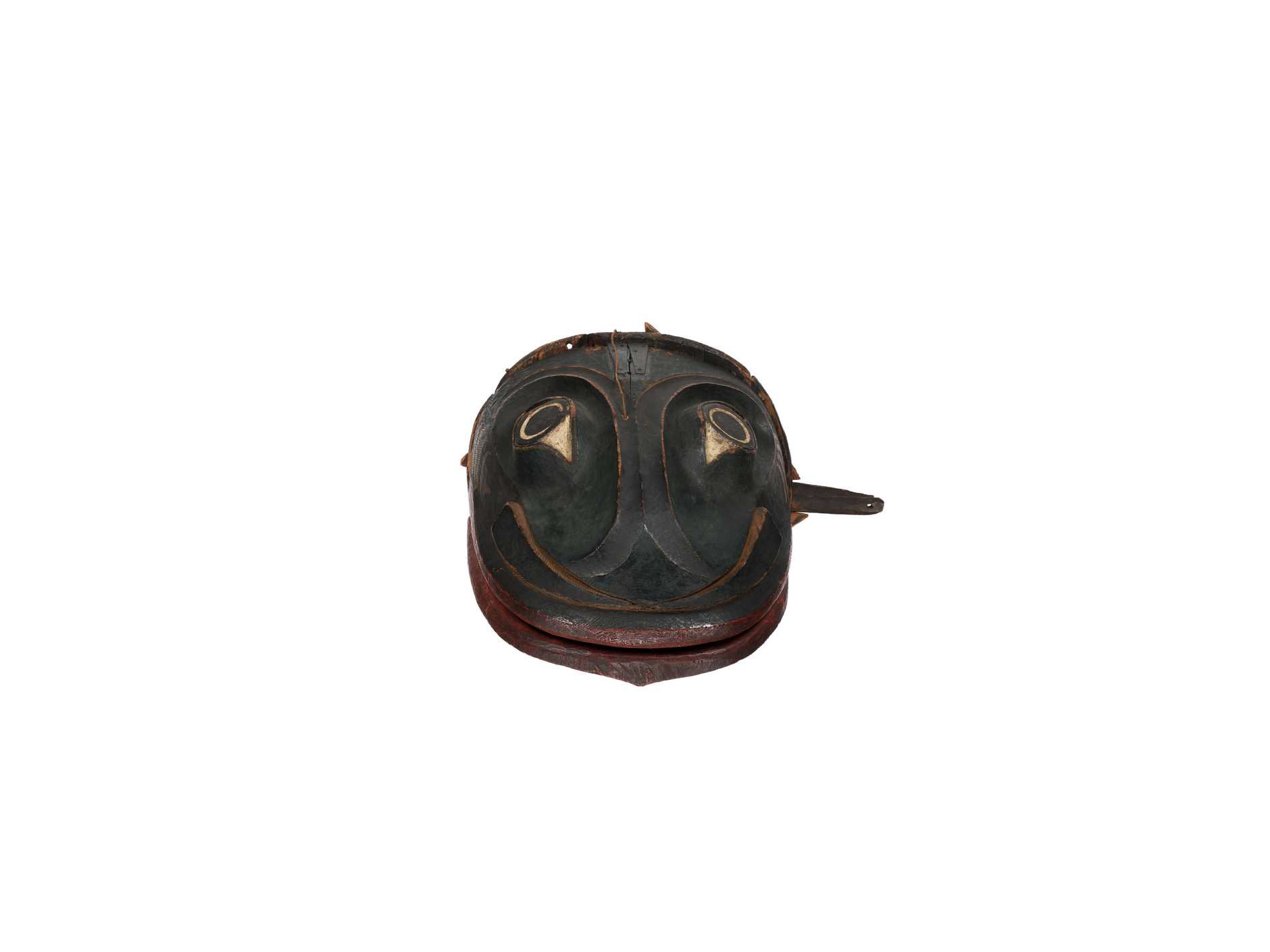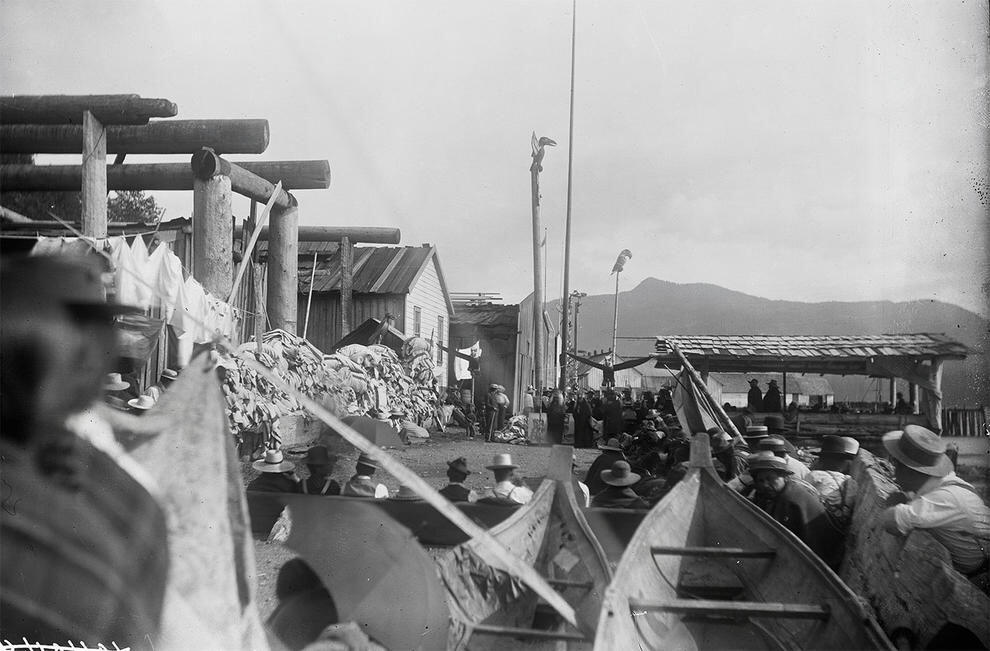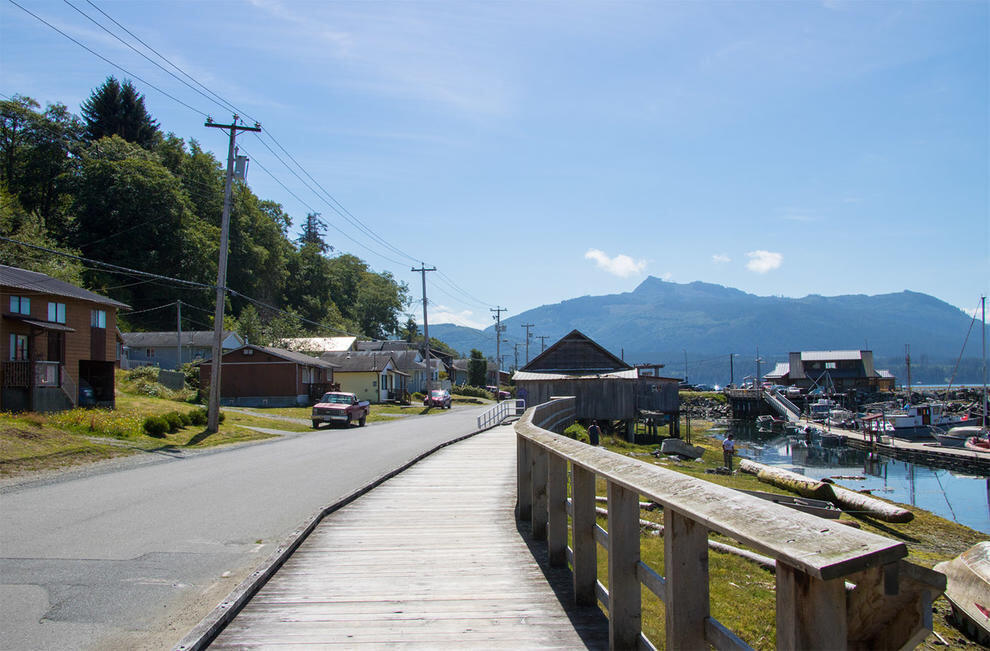Kwakwa̱ka̱’wakw
Denis Finnin/AMNH Anthropology catalog 16/8942
Selected features from the Northwest Coast Hall.
Kwakwaka’wakw means “the people who speak Kwak̓wala.” After the devastation caused by colonialism, some 19 tribes survive of the 28 that once inhabited our territories on Vancouver Island and the adjacent mainland coast. Each of our tribes has its own name and origins.
WELCOME TO THE NATION: KWAKWAKA’WAKW
[Kwakwabalas | Trevor Isaac, wearing regalia, speaks to the camera.]
KWAKWABALAS | TREVOR ISAAC (Kwakwaka’wakw, Consulting Curator) [speaking Kwak̓wala]: Gikakas’la! Nugwa’am Kwakwabalas. Gayutłan laxa Kwakwaka’wakw.
I am Trevor Isaac from the Kwakwaka’wakw Nation. Welcome to our territories.
François Gohier/VW Pics/Alamy
The Story of Siwidi
Among the Gwawa’enuxw tribe of the Kwakwaka’wakw people, a story is told of an Ancestor named Siwidi, a young man who disappoints his father and flees his village in shame. Grabbed by a giant octopus, Siwidi is taken to the copper house of K’umugwe’, Chief of the undersea kingdom. The Chief orders Siwidi to travel the underwater world accompanied by his killer whale attendants. When Siwidi returns home, he transforms into a series of sea animals. He is puzzled when his family doesn’t recognize him. That’s because Siwidi has been gone for four years, although to him it feels like four days.
The story of Siwidi is told at potlatches through the dramatic choreography of dancers in expertly engineered masks like the one below.
Dałdałag̲a̲mł | Transformation Mask

Wearing this enormous mask, a dancer portrays Siwidi as three beings. First, he returns to his village, presenting himself to his brother as a sculpin fish, but his brother doesn’t recognize him. Next, the dancer portraying Siwidi transforms into a sea raven. Finally, the sea raven mask opens to reveal Siwidi’s human face.
AMNH Anthropology catalog 16/8942
P’asa | Potlatch
potlatch | to give - Potlatches feature lavish gift-giving to guests. The term “potlatch” came from the Chinook trade language, which was used among Indigenous groups and European settlers.
POTLATCH MEANS TO GIVE
[People paddle a gracefully carved and painted canoe on water surrounded by evergreen trees and mountains.]
BARB CRANMER (Kwakwa̱ka̱’wakw, Documentary Filmmaker): My people, the Kwakwa̱ka̱’wakw have been guided by our ancestors. Our stories of origin are based on our first ancestors.
[A ceremonial mask with a long nose or beak opens to reveal a human-like face beneath. The dancer turns the face around to a surrounding crowd and then the outer mask slams shut.]
CRANMER: Ceremonial masks tell of our beginning and share our identity and where we come from.
[A curtain drops, revealing a stage full of masked dancers surrounded by evergreen branches. Down feathers swirl around them as they move. Some of the masks clatter their wooden beaks or mouths.]
[Dancers, young and old, wearing regalia, chilkat robes, button robes, and fur-trimmed headdresses move in time to singing and drums. Some hold coppers, symbols of power.]
[An image of a contemporary building, painted with a large bird form dissolves into an archival black and white image of a similar large building painted with the same design.]
CRANMER: When one's heart is glad, he gives away gifts.
[Archival images of potlatches—many people surrounded by a wealth of goods.]
CRANMER: It was given to us by our Creator—our way of doing things, of who we are. The potlatch was given to us as a way of expressing joy. Everyone on Earth is given something. This was given to us.
[At a contemporary potlatch, many people are seated in a large hall. Their faces are solemn, and some are wiping away tears.]
CRANMER: Today, most potlatches are held as memorials for loved ones. Mourning songs are sung to shake off the sadness, wipe away tears and set the spirit free.
[A wide shot of the hall. Many people are seated beneath imposing, beautifully carved and painted house posts in the form of birds and other beings. The front row all wear bright red robes, decorated with buttons sewn in varying designs.]
[SINGING AND DRUMMING]
[Eagles fly past tall evergreens in a blue sky.]
[ON-SCREEN TEXT: Potlatch Archival Footage from Barb Cranmer T'łakwagilogwa, 'Namgis First Nation Filmmaker from Alert Bay, British Columbia, Canada. Courtesy Moving Images Distribution.]
In Kwakwaka’wakw communities, people celebrate major life events, such as births, deaths and passing on of chieftainships, with potlatches. These gatherings are also our traditional government: the presence of guests at an event verifies claims of inherited status and family history. Afterward, guests are presented with food and gifts, which demonstrate the generosity of the host. The potlatch is a shared tradition across the region, but has distinct names and practices along the entire Northwest Coast.
We migrated from potlatch to potlatch. All of the significant moments in life were reflected in these rituals. From the time you were born, to the time you were 10 months old, to the time when you are an adolescent, you’d be initiated into various stages of life. They were all rites of passage.
—Kwankwanxwaligedzi-Wakas | Robert Joseph, Hereditary Chief, Gwawa’enuxw First Nation
Preparations for a potlatch begin months or even years before the important event. Among the Kwakwaka’wakw and our neighbors, it is imperative to thank guests as witnesses of the ceremonies conducted at a potlatch. These gifts, including food for hundreds of people, are often gathered by the host’s extended family. Prolific gift-giving at potlatches reinforces alliances and redistributes wealth. In times of need, our people know that they can rely on the help and cooperation of others.
Potlatch Gifts, Then and Now
Coast Funds
Silver and rose gold Raven Bracelet by Kwakwa̱ka̱’wakw artist Lloyd Wadhams, Jr.; Image: Steinbrueck Native Gallery (Angela Bogsch)
Selensergen | Dreamstime.com
Before the arrival of Europeans, a yag̲wam, or potlatch gift, included bentwood boxes, hides and eulachon fish oil. An important guest might even receive a canoe. In colonial times, blankets, silver bracelets and dishes gained favor. Today, household goods, such as towels or laundry baskets, are popular. So too are cash, jewelry, coffee and t-shirts with family crests. Bottled eulachon oil remains a cherished yag̲wam.
Potlatch Dances and Regalia
POTLATCH GIFTS
[Black and white archival photograph of women among an impressive spread of dishes.]
BARB CRANMER (Kwakwa̱ka̱’wakw, Documentary Filmmaker): The giving away of one's wealth was central to our Potlatch.
[Carved and painted beams and posts inside a gathering space. Smoke wafts through the air.]
[People carry a large carved dish filled with spoons. Dozens of green bottles sit on the floor.]
CRANMER: T'łinagila is a very important ceremony that has continued for many generations.
[Potlatch participants wearing robes and regalia decorated with buttons carry bottles of oil and place them together on the ground.]
CRANMER: The giving of eulachon oil we call t'łina is the highest honor a chief can bestow on his guests.
[On screen credits read: Potlatch Archival Footage from Barb Cranmer T'łakwagilogwa, 'Namgis First Nation Filmmaker from Alert Bay, British Columbia, Canada. Courtesy Moving Images Distribution.]
Potlatches lasted for weeks or often months in older times and would feature dances of either the ťseka (Winter Ceremonial) or the tła’sala (Chiefs' Dance or Peace Dance), but not both. Today, one- or two-day potlatches are more common and include dances of both the ťseka and tła’sala.
Sharon Grainger
U’mista Cultural Society/Vickie Jensen, UPN-01458
U’mista Cultural Society/Sabalxis, Christina Cook
Image PN2566 courtesy of the Royal BC Museum
Łuḱ’was | Feast Dish
The glossy surface on the wooden serving dish below speaks to many winters of use in a smoky Bighouse, serving salmon, cod, eulachon, seal blubber, and other oily foods to important guests. This dish, one of a set of two, represents the Ancestor Siwidi on his travels, accompanied by the killer whale attendants of K’umugwe’, Chief of the sea. The opening on the feast dish, which was used to dispense oil, echoes the blowhole of a whale.
Click on the 3D model below for a closer look.
The Potlatch Ban
POTLATCH BAN
[A woman in an interview setting, surrounded by forest and a body of water in the background.]
WOMAN 1: It was definitely a dark time for our people, and that's only in the ‘20s, the 1920s.
[Archival photographs of people in ceremonial regalia.]
WOMAN 1: They weren't allowed to practice their customs, Potlatches, and just Indian dancing and singing. Potlatch was a way of life. So when they took that away from our people, it was breaking down a whole system.
[The woman speaks to an off-camera interviewer in a forest setting.]
WOMAN 1: And it was a very difficult time for our people because they lived in fear.
[An elderly woman seated in an armchair speaks to an off-camera interviewer.]
WOMAN 2: [speaking in Kwak̓wala] They used to sneak around to practice our culture. That is why some of our people never forgot our ways.
[Archival photograph of 20-30 people in ceremonial regalia outside a large building in a village. A couple of men are dressed in suits and ties.]
WOMAN 2: [speaking in Kwak̓wala] For years nothing happened here in Alert Bay because people were terrified because they might get put in jail.
[A man sitting outside speaks to an off-camera interviewer.]
MAN: People were arrested for handing out gifts, for making speeches…
[A dancer in a bird-like carved mask moves.]
MAN: …for dancing, or anything to do helping in the Potlatch.
[The camera pans across a row of elaborately carved masks.]
MAN: Part of the agreement by the ‘Namgis and some other tribes was to give up their masks and other things they used in a Potlatch so that their members wouldn't be sent to jail.
[The first woman speaks to an off-camera interviewer in a forest setting.]
WOMAN 1: When they were brought to Oakalla Prison in 1922 it was humiliating and degrading for our people.
[Archival photographs of a young woman fashionably dressed in 1920s style, and a man holding an infant.]
WOMAN 1: Granny talks about the only reason she wasn't sent to jail was because my mom was six months old, but her older sister went to jail.
[Archival photograph of a young woman.]
[The first woman speaks to an off-camera interviewer.]
WOMAN 1: And when she got down there, they stripped them and hosed them down like there was something wrong with them, you know?
[Archival photograph of people wearing regalia, standing outside in a village.]
WOMAN 1: They didn't treat our people very good.
[ON-SCREEN TEXT: Potlatch Archival Footage from Barb Cranmer T'łakwagilogwa, 'Namgis First Nation Filmmaker from Alert Bay, British Columbia, Canada. Courtesy Moving Images Distribution.]
In 1884, the Canadian government outlawed traditional Indigenous ceremonies following years of unofficial but deliberate suppression. Government agents and missionaries deemed potlatches to be wasteful and anti-Christian, even going as far as imprisoning members of our community in 1921 for participating in a potlatch. Their ceremonial regalia were confiscated and sold by the Canadian government to museums and private collections around the world.
Image PN 2300 courtesy of the Royal BC Museum
For our community, the knowledge that Chiefs and Elders were taken to jail caused lasting spiritual damage. The Potlatch Ban was not lifted until 1951. Barbara Cranmer, of the ’Namg̲is Nation, said decades after the ban was lifted, “it still took people a long time to feel comfortable about standing up and saying, ‘This is who we are.’”
Indian Residential Schools
Warning: This story contains details of Indian Residential Schools and the abuse that took place there.
The General Synod Archives, Anglican Church of Canada, P7538-62 MSCC - St. Michael's School, Alert Bay, B.C. - taken on the day of our closing exercises, June [ca. 1932]
In 1920, Canada’s Indian Act officially compelled Indigenous children to attend so-called residential schools, often run by Christian missionaries, sometimes hundreds of miles from their families. Forbidding the use of Native languages, these institutions brutally assimilated the children into Western ways, and persisted as late as the 1990s. An estimated 150,000 children attended such schools, suffering abuse, malnutrition and even death. In recent years, Indigenous researchers began investigating former school grounds in Canada and the U.S. to locate the unmarked graves of children who never came home.
Kwankwanxwaligedzi-Wakas | Chief Robert Joseph is an Ambassador for Reconciliation Canada and an Indian Residential School survivor. The following video is just a part of his story.
CHIEF ROBERT JOSEPH ON INDIAN RESIDENTIAL SCHOOLS
[A distinguished older man in glasses sits in a wood-paneled room and speaks to an off-camera interviewer.]
CHIEF ROBERT JOSEPH (Kwakwa̱ka̱’wakw, Hereditary Chief of the Gwawaʼenux̱w First Nation): The most hurtful, damaging result of Residential Schools was dehumanizing little, little kids.
Like through various forms of assault. Physical, sexual, emotional, spiritual.
I keep telling people now- I'm thinking back at my own experience. I spent 11 years in a Residential School at Alert Bay, and I'm convinced now that all of the damage that I carried forth with me into the future was achieved in the first two weeks.
We learned survival at best. As best we could. Survival skills. So, we never spoke much. If you spoke too often you might get into trouble.
Chief Kwaxitola Henry Seaweed is a performer and cultural advisor. He is a survivor of Indian Residential Schools and recalls the following: “When I started residential school in 1948, I didn’t know a word of English. I spoke my language, Kwak̓wala, which most of us at school got in trouble for. But I really wanted to learn English. I felt left out when my friends were conversing in it. In 1954, I left school to start working. Before I left, my grandmother told me: Gwalag̲aliwe sa yak̓andas—Don’t ever forget your language. Maintain it.”
Hélène Alonso/© AMNH
I ended up living in Vancouver. It’s very difficult when you’ve been away from your people for so long. I’d grab a chair from the dining room, and I would talk Kwak̓wala to the wall. That’s how I was able to maintain my language. Now I advise the new generation as they try to grasp the language and the culture proper. I’ve been around the world spreading our culture. I never wanted to let it go.
—Chief Kwaxitola Henry Seaweed, Hereditary Chief of Gwa’sala-’Nakwaxda’xw Nation
First Nations children from northern Vancouver Island, as well as children from all over British Columbia’s North and South Coasts, and even the Interior attended the Anglican Church-run St. Michael’s Indian Residential School from the late 1800s to 1974.
In February 2015, First Nations leaders, Anglican church representatives, political officials, survivors and their families, non-Indigenous peoples, local residents, and people from far away gathered outside the red-bricked St. Michael’s to watch the school being torn down.
[The demolition of St. Michael’s Indian Residential School is] the tearing down of a bad chapter.
—Perry Bellegarde, National Chief of the Assembly of First Nations
Little Black Bear First Nation
Then and Now: Alert Bay

© AMNH Library 104471

Hélène Alonso/© AMNH
© AMNH Library 104471; Hélène Alonso/© AMNH
More Resources
Kwakwaka’wakw Consulting Curator
Chief Ga'lastawik | Trevor Isaac, Haxwa'mis
The Museum thanks Pewi Alfred and Chief Bill Cranmer of the 'Namg̲is First Nation for the Kwak̓wala words included in this text.